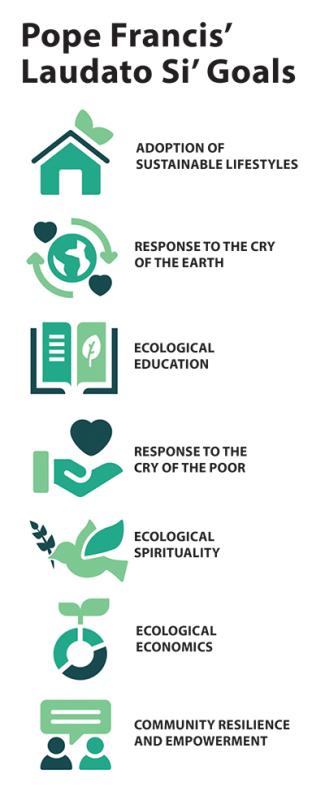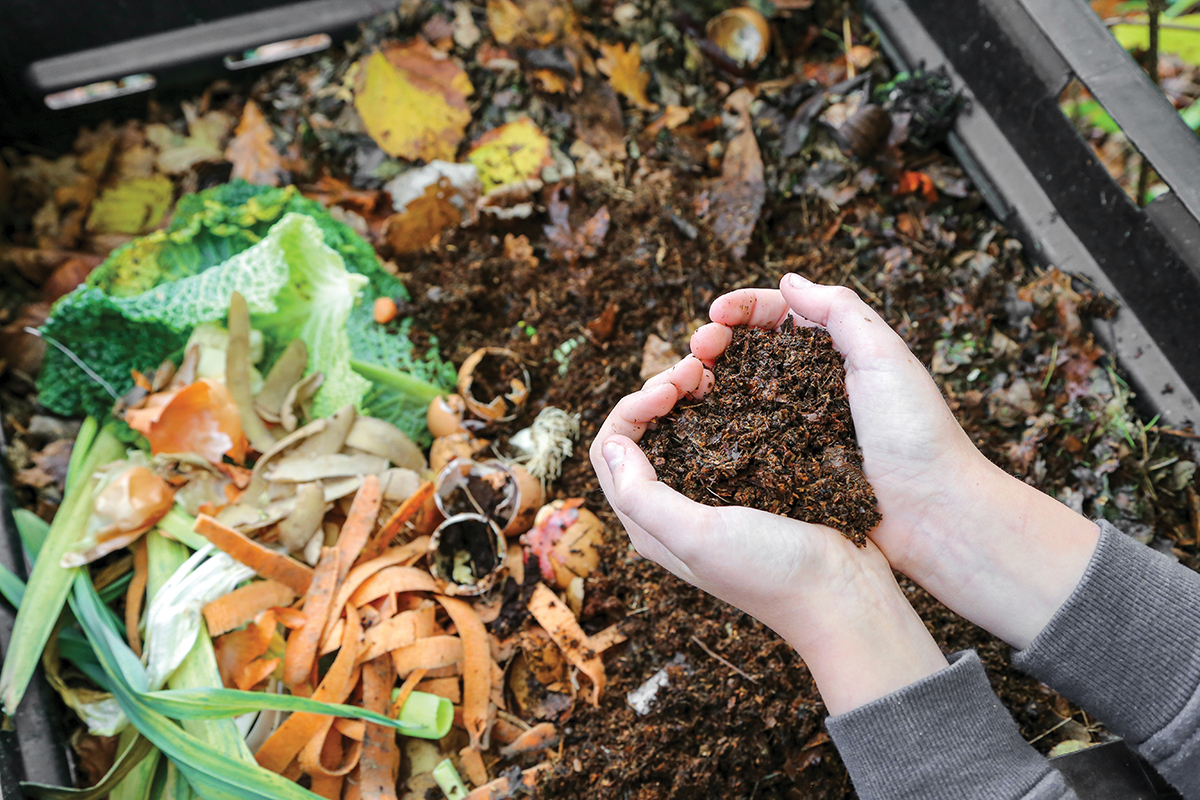Caring for Our Common Home
We find hope and confidence in our community that we can respond to this need to care for that which God has made and loved.
- Interim Vice President for Mission Molly Gower
Saint Mary’s College Commits to Laudato Si’ Action Platform
by Haleigh Ehmsen ’16
 Saint Mary’s College is addressing the climate crisis with immediate action and a global, unified, faith-based plan. In partnership with the Sisters of the Holy Cross, the College has signed on to the Laudato Si´ Action Platform and is part of its first cohort, among 30 colleges and universities in the United States—including Loyola University Chicago and Georgetown University—as well as others around the world.
Saint Mary’s College is addressing the climate crisis with immediate action and a global, unified, faith-based plan. In partnership with the Sisters of the Holy Cross, the College has signed on to the Laudato Si´ Action Platform and is part of its first cohort, among 30 colleges and universities in the United States—including Loyola University Chicago and Georgetown University—as well as others around the world.
Named for Pope Francis’ 2015 encyclical to address climate damage, Laudato Si´ puts the pope’s philosophy of caring for our common home into practice. It also provides structure and a network of colleges and universities to work together for greater impact. It is a call that Saint Mary’s is answering from a place of deep faith and hope for the future.
Over the course of seven years—the duration of the action platform—Saint Mary’s College is prepared to take on environmental challenges that impact our campus and students. By creating a Laudato Si´ taskforce, the College will create a plan that will galvanize the entire community to achieve its goals.
Students get the urgency. The damage has been done, and they are seeing the impact of the changes that are happening to the earth. Rooted in our Catholic social teaching, we know that earth gives us life...and God designed us to take care of the earth.
- Professor Chris Cobb
The taskforce is aligned with the College’s strategic plan, Revere and Revise, which calls on the Saint Mary’s community to build on the sustainability work already accomplished and underway. Including environmental stewardship in the strategic plan is the College’s acknowledgement of the global threat of climate change and the urgency to take action now.
Making the commitment was an unqualified yes, said Molly Gower, assistant professor of religious studies and theology and interim vice president for Mission.
“It’s important that we do the hard work of learning what is real, even when it is scary,” Gower said. “Saint Mary’s is a place where our students learn and grow academically and spiritually. It takes honesty and courage to open our eyes to see what is real in the world. Things are broken and need repairing. We find hope and confidence in our community that we can respond to this need to care for that which God has made and loved.”
It’s Time for Urgency
 This isn’t a new commitment for the Saint Mary’s community. In the 1990s the congregation and the College signed on to the United Nations’ Earth Charter, which lays out ethical principles for building a just, sustainable, and peaceful society. The way the College and the Sisters respond to the needs of the earth and their community should also continue to change with the growing urgency of climate change, said Sister Veronique Wiedower ’70, CSC, president of the Sisters of the Holy Cross.
This isn’t a new commitment for the Saint Mary’s community. In the 1990s the congregation and the College signed on to the United Nations’ Earth Charter, which lays out ethical principles for building a just, sustainable, and peaceful society. The way the College and the Sisters respond to the needs of the earth and their community should also continue to change with the growing urgency of climate change, said Sister Veronique Wiedower ’70, CSC, president of the Sisters of the Holy Cross.
“The timing is right to answer the Vatican’s call-to-action, to share our experiences and learn from others globally,” Wiedower said. “Together we can accomplish more.”
There are seven specific goals within the overall Laudato Si´ platform: response to the cry of the earth, response to the cry of the poor, ecological economics, adoption of sustainable lifestyles, ecological education, ecological spirituality, and community resilience and empowerment.
Chris Cobb, associate professor of English and environmental studies, and educational director of the Sustainable Farm, noted that signing on to the Laudato Si´Action Platform is a commitment that validates the significance of caring for our planet. “We seek to transform our relationship with the earth to one that authentically acknowledges that earth is our common home, and the way that we care for earth is the way we care for all of creation,” Cobb said.
The Action of Stewards
As the College makes this seven-year commitment, the first step is assessing the current environmental sustainability initiatives. For many years students, faculty, and staff have paid special attention to improving sustainability on campus. Some examples include the “free store,” which diverts the end-of-semester move-out waste, reducing single-use plastics, water bottles and straws, hosting Food Justice Week, among other initiatives. Eliana Sanchez ’22 worked with the Food Recovery Program during her first three years at Saint Mary’s. She recruited student volunteers and worked with Campus Dining to take hot meals to the Center for the Homeless in downtown South Bend, altogether eliminating food waste from the dining hall.
Her experiences with food recovery and other campus initiatives inspired her to take on an additional major in environmental studies. “When I came to Saint Mary’s, it was the first time I was exposed to how important it is to take care of the environment and the connection to my faith,” Sanchez said. “As I learned more about the climate crisis and how it is connected to my faith, it became integral to how I practice my faith.”
Sanchez, who served as the student trustee, is proud that the College has signed on to the Laudato Si´ Action Platform. She took a tri-campus sustainability course, co-taught by Cobb and other instructors at the University of Notre Dame and Holy Cross College, where she became passionate about creating a more sustainable future.
“We need institutional-level actions and through taking that course I learned that Saint Mary’s was already doing a lot,” Sanchez said. “I’m excited that Saint Mary’s will continue to grow in sustainability efforts to address the climate crisis.”
In 2020, the College’s Sustainable Farm began its first growing season. The farm provides experiential learning for Saint Mary’s students, who use its soil to conduct research. Students in Cobb’s conservation biology course were tasked with developing a plan for addressing an invasive species at the farm, Canadian thistle. They created a comprehensive, practical plan for implementation that the College’s farmer, Deb Durall, and her team have since executed. “There will be modifications to the plan as we learn from experience; the next conservation biology class members will study the results at the farm and the plan’s implementation, then adjust the plan accordingly,” Cobb said.
 Other ongoing projects are facilitated by the Office for the Common Good, including two programs that are addressing food waste: composting and food recovery, the initiative Sanchez tackled while at Saint Mary’s. These programs are carried out by student leaders and volunteers. Compost from the dining hall is transferred to the farm and can be used to nourish the soil and the crops that grow there.
Other ongoing projects are facilitated by the Office for the Common Good, including two programs that are addressing food waste: composting and food recovery, the initiative Sanchez tackled while at Saint Mary’s. These programs are carried out by student leaders and volunteers. Compost from the dining hall is transferred to the farm and can be used to nourish the soil and the crops that grow there.
Responding to the Call
In year one, the College will focus on education and taking inventory of current initiatives. This will help evaluate existing initiatives and discover other opportunities to improve the College’s sustainability.
The Going Green Committee, which has been in existence at the College since the 1990s, will become the Laudato Si´ Action Platform Committee. This will help to build on current initiatives and expand the scope of a more sustainable lifestyle on campus.
When I came to Saint Mary’s, it was the first time I was exposed to how important it is to take care of the environment and the connection to my faith.
- Eliana Sanchez
Faculty, staff, and students will be involved in the action platform over the next seven years, and Cobb noted that they are important advocates for this initiative. “Students get the urgency. The damage has been done, and they are seeing the impact of the changes that are happening to the earth,” he said. “Rooted in our Catholic social teaching, we know that earth gives us life. We are an interdependent community, and God designed us to take care of the earth.” †
